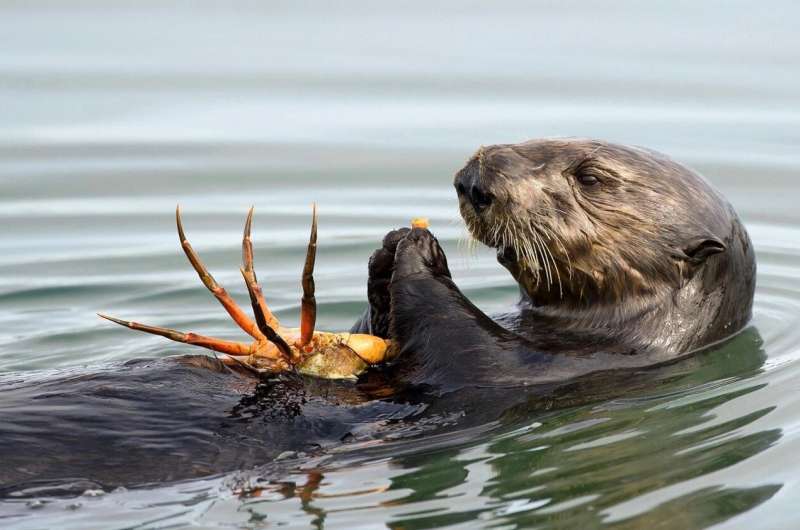#Ocean toxin a heartbreaking threat for sea otters

“#Ocean toxin a heartbreaking threat for sea otters”

Heart disease is a killer threat for southern sea otters feasting on domoic acid in their food web, according to a study led by the University of California, Davis.
The study, published in the journal Harmful Algae, examined the relationship between long-term exposure to domoic acid and fatal heart disease in southern sea otters, a threatened marine mammal.
“Sea otters are an amazing indicator of what’s happening in the coastal environment, not just to other marine animals, but to us, too, especially on the issue of domoic acid,” said Christine K. Johnson, director of the EpiCenter for Disease Dynamics in the One Health Institute at the UC Davis School of Veterinary Medicine and senior author of the study.
In hot water
Domoic acid is a neurotoxin that accumulates in the food web, contaminating crabs and clams—common prey for sea otters. It is produced by harmful algal blooms, which typically occur when water is unusually warm. For example, a massive warm water “blob” in 2015 created a widespread toxic bloom along the West Coast, causing domoic acid levels to spike and forcing the closure of that season’s Dungeness crab fishery.
Climate change projections indicate that toxic blooms and domoic acid exposure will continue to rise. The world’s ocean temperatures in 2020 were the third highest on record, and all five of the oceans’ hottest years on record occurred in the past five years.

Over-exposed otters
To identify the ecological drivers of heart disease, the scientists combined several domoic acid datasets with detailed life history data from 186 free-ranging southern sea otters in California from 2001 to 2017. Of those animals, necropsy reports show that heart disease was a cause of death for 34 of the 48 otters that died during that time.
The scientists found that domoic acid exposure increased a sea otter’s risk of dying with heart disease 1.7-fold. The risk is up to 2.5 times greater for otters consuming a high proportion of crab and clam, which accumulate domoic acid in their tissues, helping it persist in the food web.
The study was also the first to demonstrate a disturbing and unexpected trend: Domoic acid exposure is especially detrimental for prime-age adult sea otters, whose survival is vital for population growth.
“That’s worrisome for the long-term population recovery of southern sea otters, which are a threatened species,” said lead author Megan Moriarty, a wildlife veterinarian who conducted this research for her Ph.D. in epidemiology at UC Davis. “This study emphasizes that domoic acid is a threat that isn’t going away. It’s a food web toxin and is pretty pervasive.”
Infection with Toxoplasma gondii, a parasite associated with wild and feral cat feces on land that makes its way to the ocean, also increased the risk of fatal heart disease 2.4-fold.
Co-author Melissa Miller, a veterinarian and pathologist with the California Department of Fish and Wildlife and a UC Davis One Health Institute affiliate, recently led a separate study analyzing the causes of death of sea otters.
“Improving our understanding of the effects of domoic acid on the health and population recovery of southern sea otters is extremely important” said Miller of the domoic acid study. “Given their unique biology and specialized diet, sea otters are extremely vulnerable to toxic algal blooms, which are likely to worsen with climate change. So the results of this work have far-reaching implications.”
Maine orders partial shellfishing shutdown, mussel recall
Megan E. Moriarty et al, Exposure to domoic acid is an ecological driver of cardiac disease in southern sea otters✰, Harmful Algae (2021). DOI: 10.1016/j.hal.2020.101973
Citation:
Ocean toxin a heartbreaking threat for sea otters (2021, January 26)
retrieved 26 January 2021
from https://phys.org/news/2021-01-ocean-toxin-heartbreaking-threat-sea.html
This document is subject to copyright. Apart from any fair dealing for the purpose of private study or research, no
part may be reproduced without the written permission. The content is provided for information purposes only.
If you liked the article, do not forget to share it with your friends. Follow us on Google News too, click on the star and choose us from your favorites.
For forums sites go to Forum.BuradaBiliyorum.Com
If you want to read more Like this articles, you can visit our Science category.


